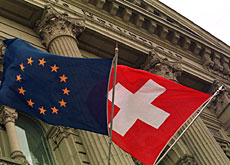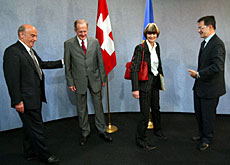EU calls time on sweeteners for sugar producers

Swiss sugar producers are bracing for a fall in prices, after the European Union unveiled plans to cut sweeteners for the bloc’s farmers.
The European Commission on Wednesday endorsed a proposal to slash sugar production and cut prices by a third.
The move comes as pressure mounts on the EU to reform its agricultural support programmes. Critics say the EU’s policy of providing subsidies to sugar producers distorts world markets and harms the interests of farmers in the developing world.
Presenting the planned reforms in Brussels on Wednesday, the EU’s agriculture commissioner, Franz Fischler, said the Commission wanted the reforms in place by July 2005.
“There is a lack of competition [and] consumers and sugar-consuming industries pay over high prices,” said Fischler. “And the way we subsidise sugar production has been the subject of fierce criticism, particularly from developing countries.”
He added that the price of European sugar is already three times higher than the global market average.
The proposal calls for Europe-wide price reductions of up to 40 per cent, and a cut in export subsidies. Total output would be reduced by 2.8 million tons (from 17.4 million) over four years.
Job losses
Fischler conceded that the changes would likely result in job losses, hurting some European farmers and sugar mills, as well as former European colonies which benefit from a preferential import regime.
Switzerland’s State Secretariat for Economic Affairs (Seco) said changes in the EU’s sugar policy would force Swiss producers to lower their prices.
“We would have to follow the price drop,” said Seco’s Willy Tinner. “The food industry, which one of the biggest sugar consumers, would not accept paying a higher price for the local product.”
Under a bilateral agreement still to be signed between Bern and Brussels, tariffs are to be abolished or reduced on processed agricultural products. The agreement also obliges the Swiss to cut their export subsidies.
Imports
Switzerland produces 200,000 tons of sugar annually and imports nearly the same amount. In 2000, for example, about 370,000 tons were used, with 141,000 tons re-exported as processed agricultural products.
“We have to estimate the actual impact, but we know that there will be pressure to drop prices,” Roland Furrer of the Swiss Farmers’ Union told the “Le Temps” newspaper.
Swiss sugar beet producers get SFr11.20 ($9.06) per 100 kilograms, versus SFr6.70 for their EU counterparts.
“This price difference is due to the SFr35 million in subsidies paid out by the Swiss government,” explained Jacques Chavaz of the Federal Agriculture Office.
Furrer says a drop in prices would not be a catastrophe for most producers, since the majority of them have other crops to sell.
Suffer
But he admits that farmers in the Seeland area centred around Neuchâtel, Biel and Murten would suffer because of their heavy reliance on sugar beet production.
Swiss farmers will be hoping that their EU counterparts, along with some governments, will be able to water down the proposals, which have to be approved by the EU’s 25 member states.
But reforming sugar, and the rest of the EU’s agricultural support regime, is considered a prerequisite if trade talks at the World Trade Organization (WTO) are to move forward.
A legal challenge against the EU is pending at the WTO, with Australia, Brazil and Thailand accusing Brussels of forcing world sugar prices below cost with its subsidies.
“This proposal gives us additional flexibility in the WTO,” said Fischler. “[It] sends a very clear signal to our international partners and developing countries.”
swissinfo
There are more than 7,500 sugar beet producers in Switzerland.
Annual production is around 200,000 tons.
There are two sugar mills: in Aarberg and Frauenfeld.
Each Swiss consumes on average 40kg of sugar a year.

In compliance with the JTI standards
More: SWI swissinfo.ch certified by the Journalism Trust Initiative











You can find an overview of ongoing debates with our journalists here . Please join us!
If you want to start a conversation about a topic raised in this article or want to report factual errors, email us at english@swissinfo.ch.